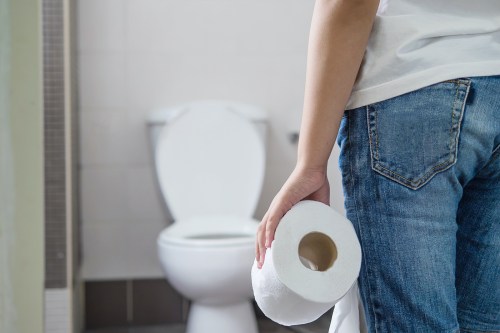If You Have a Stockpile of 75 Rolls of TP, Your Emotionality Trait May Be Strong—Here’s What That Means
If you have a stockpile of toilet paper, your emotionality trait may be strong. So, what is emotionality? A psychologist breaks it down.

It was the second week of March when I ran out of toilet paper, right in the midst of when toilet paper was pretty much nowhere to be found. And because I’m a last-minute kind of gal with a questionable sense of foresight, I waited until I was fully out. Like—without even a single-ply square left and only paper towels to help me in an eventual moment of weakness. Probably to the surprise of no one, when I did get to the store to finally restock my bathroom, I found nothing but empty shelves, started to panic, and went to a different location.
Finally, I got to a store that had a several eight-packs of TP left, and I considered buying all of them. But, I didn’t—I live alone and don’t need dozens of rolls of TP at any given time, thank you very much. According to a recent study, though, if you were one of those toilet-paper hoarders, there’s a chance you have a very strong trait of emotionality. But what is emotionality, anyway—and what can it tell you about yourself (beyond a greater likelihood that you have a panic room full of toilet paper)?
“Emotionality is the part of an emotion that can be observed and, in some cases, measured,” says clinical psychologist Aimee Daramus, PsyD. Basically, it’s the measure of your emotional response to something and how you behave as a result—like, for example, feeling afraid about the effects of the pandemic and resulting lockdown orders, and reacting by hoarding toilet paper. That’s high emotionality at play, because it highlights you reacting very strongly to a feeling.
If you have a low emotionality trait, you’re likely less reactive than others to a gievn emotion (ahem, paging my ex-boyfriend). This reaction can occur either inwardly or outwardly. If you have average emotionality, Dr. Daramus says that your reaction likely seems proportionate to your emotions.
“Higher emotionality people can be more passionate and exciting, but also more easily thrown off their game, and the drama can be damaging to relationships.” —clinical psychologist Aimee Daramus, PsyD
When it comes to what level of emotionality is ideal, Dr. Daramus calls upon the Golidlocks effect, noting “just enough” is best “because it isn’t as socially or mentally disruptive,” she says. “Higher-emotionality people can be more passionate and exciting, but also more easily thrown off their game, and the drama can be damaging to relationships. People with low emotionality are great in a crisis, but might have a harder time connecting with people because emotion is something we bond over.”
Having high or low emotionality isn’t inherently negative, though. If it’s not doing yourself or others damage, you’d be well-served access self-compassion and accept yourself for who you are. But if your emotionality is causing pain, there are ways you can change it: “Emotion-management skills for high emotionality can include naming an emotion and expressing it in a healthy way, leaving a situation temporarily until you’re calmer, and self-soothing,” says Dr. Daramus. She adds that various forms of therapy, workbooks, journaling, online tutorials, and any other resource focused on calming yourself and becoming a better communicator can help.
To ascertain what your emotionality level might be, Dr. Daramus says to try asking yourself the following questions:
- 1.What situations do I function well in?
- 2.How passionate, high-drama, and chaotic are my relationships?
- 3.What am I like in a crisis?
- 4.Do I seem to feel less emotion than others? More?
So, back to the TP example: If you function well in times of calmness, but pivoting plans—or being forced to navigate into full-on crises—throw you for a loop and get a strong reaction from you, that points to high emotionality. You’re pulled to drama and chaos, and perhaps even manifest those factors by feeling a need to, say, stockpile toilet paper to begin with. And if you noticed that you felt more of a need to stockpile toilet paper than most other people you know, that also points to—yep—high emotionality.
It’s also worth noting that high emotionality can show up differently for different people. For instance, my answers to Dr. Daramus’s previous questions point to me being high on the emotionality scale, yet, I did not hoard toilet paper back in March. “You might hoard something else, adopt a new pet, panic about things you can’t control, or have an even harder time than most with either isolating or being stuck inside with people you can’t get away from,” she says. And, uh, yeah—every single one of those items rings true for me.
“On the other hand, high-emotionality people were probably the first ones to reach out and find ways to keep people connected,” Dr. Daramus adds. “High-emotionality people who have learned skills for managing emotion can be the best people to be around when people are scared, because they can manage problems through empathy and connection.” So again, if you have a ton—as in, like, a metric ton—of TP in your home right now, you may well be a high-emotionality person, but that’s not at all an inherent bad thing.
Sign Up for Our Daily Newsletter
Get all the latest in wellness, trends, food, fitness, beauty, and more delivered right to your inbox.
Got it, you've been added to our email list.










